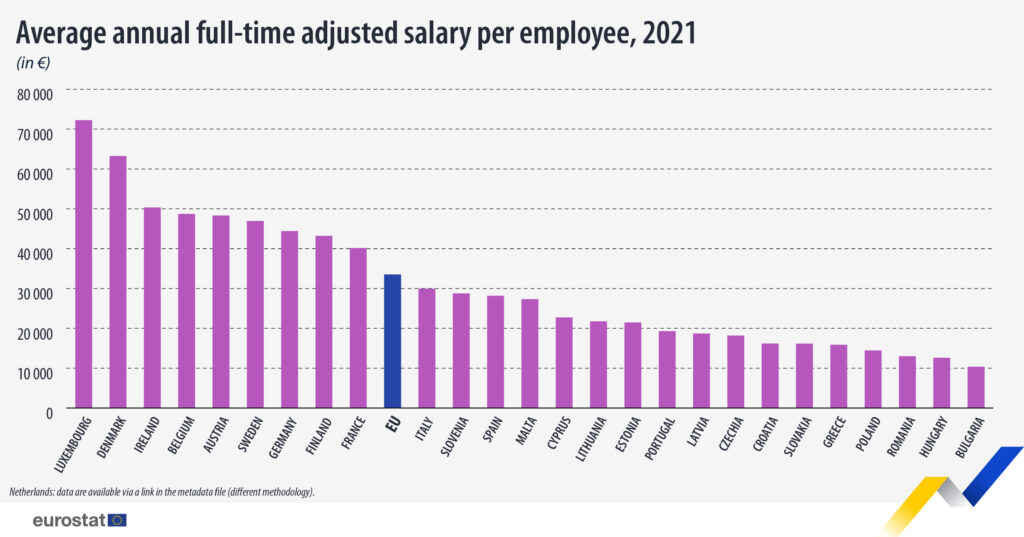(Editor’s note: This Blue Card post will be updated from time to time as rules and requirements change.)
The first time I heard about the EU Blue Card was when I was in Germany in the mid-2010s, and the country was advertising for highly skilled professionals to work in Germany on a Blue Card. German officials were looking for medical doctors, nurses, engineers, mathematicians, and IT specialists. Since I wasn’t qualified, I put it out of my mind.
However, it is still a thing … an increasingly important thing as European countries seek more highly skilled internationals.
Objectives and participating countries
The EU Blue Card program was launched in the new millennium. According to the EU Blue Card Network, it was “designed to make Europe a more attractive destination for professionals from outside the European Union.” It has been adopted by 25 European member states, excluding Denmark and Ireland.
However, European countries vary greatly in the number of Blue Cards they issue, as noted by the European Commission, with most of the Blue Cards being released by Germany.
You can imagine that a country with a robust economy and a desire for more skilled workers, such as Germany, would be giving out more Blue Cards than a country with high unemployment, such as Italy or Spain.
Requirements
To request an EU Blue Card, as detailed on the EU Blue Card Network, three key conditions must be met:
• Non-EU citizenship
• Educated or professionally experienced
• Employment contract or binding employment offer
The first condition is clear cut – either you are or you aren’t. The second condition could be as explicit as having a master’s degree or equivalent, or having at least 5 years of experience in your field. The third condition is concrete and may require a salary threshold or a precise length of time.
More on the last two conditions in the following paragraphs and links.
Country-specific details and resources
Since each country has slightly different rules and procedures, you will want to look at the country-specific section and then carry on from there:
• The European Union’s Official Website on Blue Cards is not easy to navigate, but here’s how to get to the key information: Start with the immigration portal, scroll down to Essential Information, and then select the country on the map that you are interested in. This will give you details for your country of
choice.
See below for more country-specific links.
• As a companion resource, check out the EU Blue Card Network Website, which is very well organized.
• VisaGuide.World also has a lot of helpful information on Blue Cards.
Caveat
The EU Immigration Portal states that “only EU Member State authorities may issue Blue Cards” and cautions against any unofficial application sites which may contain incorrect information or charge for their services. They also note that “you or your employer must apply for the card through the competent national authorities in the country where you wish to work. Depending on the rules in that country, you may have to pay an application fee.”
Getting an employment contract or binding employment offer
Getting a contract or offer would probably be easier if you were already in country; nonetheless, here are three suggestions to make it happen:
Option No. 1 – Work Your Connections
If you already have some connections, for example, when you were in graduate school or working in country, try soliciting employers directly to see if you can get an employment contract or binding employment that way.
Option No. 2 – Use EU Jobseekers Website
Or you could try your luck on the EU Jobseekers Website.
Option 3 – Let Someone Else Do the Work
Or you could go through a network that helps employers find you, such as the EU Blue Card Network. Here you are able set up an account profile, which can be viewed by employers who can potentially offer you an employment contract.
Benefits of the BlueCard
The EU Blue Card is “a work and residence permit for non-EU/European Economic Area (EEA) nationals,” as stated on the EU Blue Card Network.
They highlight on their website some of the very nice benefits:
• Working and salary conditions equal to nationals
• Free movement within the Schengen Area
• Entitlement to a series of socio-economic rights (e.g., unemployment benefits)
• Favourable conditions for family reunification
• Permanent residence perspective
• Freedom of association
Even though, it might take a lot of time and effort to get a Blue Card, if it puts you where you want to live and work, then why not go for it?

Info on country-specific Blue Cards
It’s important to note that the Blue Cards regulations are not harmonized across the EU.
In 2021, the average annual full-time adjusted salary for employees in the EU was 33,500 euros. The Blue Card Directive can help you determine the average gross annual salary for each EU member state and granting working permits to high-skilled workers.
• You can apply for the Croatian EU Blue Card here form 4A in Croatia, or at a Croatian diplomatic mission outside the country.
• You can get information about the Bulgarian Blue Card including a link to the application website here.
• You can get more information on Spain’s Blue Card here.
• You can get more info on Luxembourg’s Blue Card requirements here.
• You can get more information on the Netherlands’ Blue Card requirements here.
• You can get the details about Germany’s Blue Card requirements here.
–––––––––
Here’s more granular detail about the EU Blue Card on the official Make it in Germany website.
Read more about visas in Dispatches’ archives here.
Mary Porcella is a Europhile who has lived in Germany, Norway, Italy, and the U.S. She is a writer, editor, and photographer. She loves seeing new places, returning to old haunts, and meeting up with family and friends. As of today, her travels have taken her to 20 European countries, and she hopes to visit the rest.















